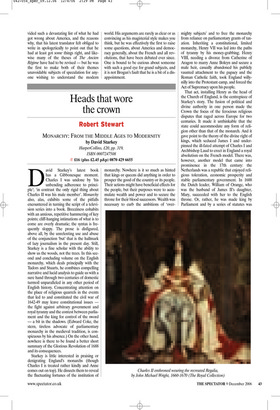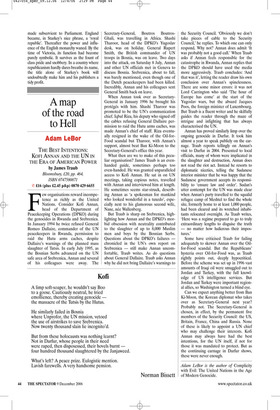Heads that wore the crown
Robert Stewart
MONARCHY: FROM THE MIDDLE AGES TO MODERNITY by David Starkey HarperCollins, £20, pp. 319, ISBN 0007247508 ✆ £16 (plus £2.45 p&p) 0870 429 6655 David Starkey’s latest book has a Gibbonesque moment. Charles I was undone by ‘his unbending adherence to principle’; ‘in contrast the only rigid thing about Charles II was his male member’. Monarchy also, alas, exhibits some of the pitfalls encountered in turning the script of a television series into a book. Breeziness cohabits with an anxious, repetitive hammering of key points; cliff-hanging intimations of what is to come are overly dramatic; the syntax is frequently sloppy. The prose is disfigured, above all, by the unrelenting use and abuse of the conjunction ‘but’ that is the hallmark of lazy journalism in the present day. Still, Starkey is a fine scholar with the ability to show us the woods, not the trees. In this second and concluding volume on the English monarchy, which deals principally with the Tudors and Stuarts, he combines compelling narrative and lucid analysis to guide us with a sure hand through two centuries of domestic turmoil unparalleled in any other period of English history. Concentrating attention on the place of religious quarrels in the events that led to and constituted the civil war of 1642-49 may leave constitutional issues the fight against arbitrary government and royal tyranny and the contest between parliament and the king for control of the sword — a bit in the shadows. (Edward Coke, the stern, tireless advocate of parliamentary monarchy in the medieval tradition, is conspicuous by his absence.) On the other hand, nowhere is there to be found a better short summary of the Glorious Revolution of 1688 and its consequences.
Starkey is little interested in praising or denigrating England’s monarchs (though Charles I is treated rather kindly and Anne comes out on top). He dissects them to reveal the fluctuating fortunes of the institution of monarchy. Nowhere is it so much as hinted that kings or queens did anything in order to prosper the good of the country or its people. Their actions might have beneficial effects for the people, but their purposes were to accumulate wealth and power and to secure the throne for their blood successors. Wealth was necessary to curb the ambitions of ‘over mighty subjects’ and to free the monarchy from reliance on parliamentary grants of taxation. Inheriting a constitutional, limited monarchy, Henry VII was led into the paths of tyranny by his money-grabbing; Henry VIII, needing a divorce from Catherine of Aragon to marry Anne Boleyn and secure a male heir, casually abandoned his publicly vaunted attachment to the papacy and the Roman Catholic faith, took England willynilly into the Protestant camp, and forced the Act of Supremacy upon his people.
That act, installing Henry as the head of the Church of England, is the centrepiece of Starkey’s story. The fusion of political and divine authority in one person made the Crown the focus of the ferocious religious disputes that raged across Europe for two centuries. It made it unthinkable that the state could accommodate any form of religion other than that of the monarch. And it gave point to the theory of the divine right of kings, which seduced James I and underpinned the ill-fated attempt of Charles I and Archbishop Laud to erect in England a royal absolutism on the French model. There was, however, another model that came into prominence in the 17th century: the Netherlands was a republic that enjoyed religious toleration, economic prosperity and stable parliamentary government. In 1688 the Dutch leader, William of Orange, who was the husband of James II’s daughter, Mary, succeeded with her to the English throne. Or, rather, he was made king by Parliament and by a series of statutes was made subservient to Parliament. England became, in Starkey’s nice phrase, a ‘royal republic’. Thereafter the power and influence of the English monarchy waned. By the time of Victoria, its function had become purely symbolic. It survives as the fount of class pride and snobbery. In a country where republicanism hardly dares breathe its name, the title alone of Starkey’s book will undoubtedly make him and his publishers a tidy profit.



























































































 Previous page
Previous page